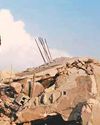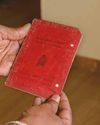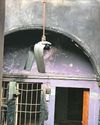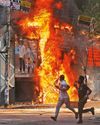
The son of two causes-Palestine and Syria”, he is known for his nuanced exploration of exile, identity and displacement. He has published five poetry collections in Arabic, which have been translated into several languages, including German, English and Polish, with his writing appearing in anthologies and magazines worldwide. His works have inspired performances, musical compositions and visual artworks. He spoke to Vineetha Mokkil about the pathology of war and the price of writing about it. Excerpts:
How do you write about war and the human suffering it causes, which is a daunting subject with so many nuances?
Writing is writing. For me, it is an act of resistance, an act of existence and an act of survival. It is a continuous process of excavation, exploration, giving, and critique. My narratives are predominantly poetic, and this type of writing is neither easy to create nor read. I believe choosing this path was not a bad decision, even though it has not been approached without tension.
However, tension, insecurity and suffering in writing, or in dealing with it, are intrinsic to the nature of war and conflict. How can we write a comfortable, easy and safe text about a subject that is neither easy, comfortable, nor safe? No matter how expansive literature and imagination may be, they sometimes stand powerless in the face of the enormity and obscenity of reality. "When your surgical priority for a beautiful 13-year-old girl is to reconstruct her eyelids so that she can have a prosthetic eye, a part of you dies." This statement by Dr Ghassan Abu-Sittah, a plastic surgeon returning from Gaza, exemplifies it. What can literature do in the face of such a sentence?
This story is from the January 21, 2025 edition of Outlook.
Start your 7-day Magzter GOLD free trial to access thousands of curated premium stories, and 9,000+ magazines and newspapers.
Already a subscriber ? Sign In
This story is from the January 21, 2025 edition of Outlook.
Start your 7-day Magzter GOLD free trial to access thousands of curated premium stories, and 9,000+ magazines and newspapers.
Already a subscriber? Sign In

Nomadland
All eyes are on President-elect Donald Trump and his policy on immigration

Far from Home
We have forgotten the plight of Afghans who fled to India, and continue to suffer

Bang Bang That Awful Sound
What happens when we listen closely to the soundscape of war?

Refugee Dilemma
For most Indian-origin Sri Lankan Tamils, who are victims of ethnic conflict and civil war, proving that they are not illegal migrants is a nearly impossible task

They Poured Fire on Us
The resilience of refugee women from Sudan, Ethiopia and Yemen in the face of war and displacement is remarkable

The Sound and the Fury
Iraqi poet, novelist, translator and scholar Sinan Antoon was born and raised in Baghdad.

The Day I Became a Woman
In a country where authorities have been directly engaging in the gruesome war against women for decades, artists like Nahid Hassanzadeh stand apart as a voice of dissent–a haunting reminder of the unwavering spirit of the rebellious Iranian women fighting against the Islamic Republic’s violent crackdown.

The Kite Runner
The official figure of civilian deaths in Afghanistan is a serious underestimate. It is unlikely that we will ever know the real cost of Afghan lives

American Patriot
Barring a few exceptions, Hollywood movies continue to be gung-ho about the United States' penchant for waging wars across the globe

The Hunters
How can Bangladesh's fractured society, burdened by layers of trauma, begin to heal?
